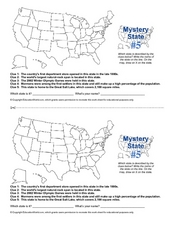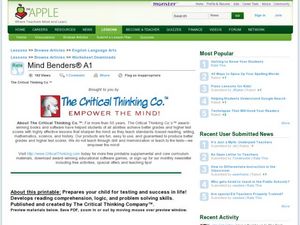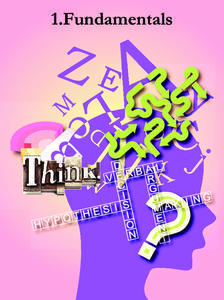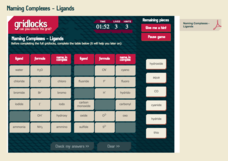Curated OER
Mystery State # 5
Mystery state number five is none other than Utah! Quiz your kids on state knowledge while building deductive reasoning skills. They use each of the five clues to determine the name of the mystery state. A great warm up when studying...
Curated OER
Geography A to Z: The Letter G
Using clues to answer questions is a way to increase deductive reasoning skills. Kids answer seven geography clues with answers all starting with the letter G. A great way to test world geography or warm up the class.
Intel
Forensics: Get a Clue
Although the methods are all scientific, forensic science was started by police officers rather than scientists, who relied on observation and common sense. Young detectives use many tools to solve crimes around the school in a...
Curated OER
Divisibility Rules
In this divisibility rules worksheet, learners solve 18 different problems that include applying the divisibility rules to each. First, they identify the hypothesis and conclusion in logical deduction. Then, students determine the...
Curated OER
Mind Benders: Name the Animals
In this deductive reasoning worksheet, students read the clues about a cat, a small do, a goat, and a horse and identify them. Students solve 3 answers.
Curated OER
Logic
Students solve problems using reasoning techniques, identify the validity or non-validity of problems and use deductive reasoning for problem resolution.
Curated OER
Deductive and Inductive Reasoning
Students analyze and distinguish between deductive and inductive arguments. They produce, construct and evaluate deductive and inductive arguments. Each student reviews a list of key terms dealing with both types of arguments and...
Curated OER
Proof by Induction
In this induction worksheet, high schoolers read word problems. They determine the difference between inductive and deductive reasoning. Students solve the given problem through inductive reasoning. This one-page worksheet contains 1...
Curated OER
Logic and Proof Writing
Students define inductive and deductive reasoning and write two column proofs. In this geometry lesson, students analyze arguments and draw conclusion. They define steps necessary to arrive at the correct answer when completing proofs.
Curated OER
Missionaries and Cannibals
In this missionaries and cannibals worksheet, students read a word problem and use logic and deductive reasoning to solve the problem. This one-page worksheet contains one problem. Answers are provided at the bottom of the page.
Curated OER
The Treasure Hunt
In this treasure hunt learning exercise, students determine a combination of events that satisfies given conditions. This one-page learning exercise contains 1 logic problem. The answer is provideed at the bottom of the page.
Curated OER
Baseball Lineup
For this deductive resoning worksheet, students use 9 clues do determine which player plays each position on a baseball team.
Curated OER
Performing a Play
Students discover logical deduction by participating in a play. In this reasoning activity, students act as characters from a play who's words must be analyzed to see if they are true or not. Students perform parts of the play and...
Education Bureau of Hong Kong
Fundamentals
"Fundamentals," the first lesson in a series of eight, introduces the basic concepts and strategies covered in a series of resources designed to teach high schoolers critical thinking skills. The worksheets and activities in this first...
Royal Society of Chemistry
Apparatus Diagrams 1
One of the biggest challenges for beginning scientists is figuring out the names of the equipment! Introduce your chemistry class to essential lab apparatuses using a series of related games. Pupils pair images of a test tube, funnel,...
Royal Society of Chemistry
Elements 1
The periodic table can be a little overwhelming to young scientists. Meet your class' worries head on by introducing the table in a game. Individuals test their knowledge of the names and symbols of common elements, then use deductive...
Royal Society of Chemistry
Apparatus Diagrams 2
Ready to heat things up in the lab, but your class doesn't know its way around a Bunsen burner? Scholars get familiar with heating apparatuses through a series of puzzles designed to promote vocabulary and reasoning skills. The activity...
Royal Society of Chemistry
Extraction of Copper
Is copper found as a raw material? Science sleuths manipulate the reactants and products found in the copper extraction process in a series of fun puzzles. The interactive engages learners in pairing formulas with their names while using...
Royal Society of Chemistry
Halide Ion Tests
Young chemists love it when colorful solid products appear in a reaction vessel! Scholars discover the products that form during halide ion tests through a hands-on activity. Users go online and apply chemistry knowledge and reasoning...
Royal Society of Chemistry
Functional Groups
Looking for a highly functional tool to teach young chemists functional groups? Engage the class with a series of logic-based games. Users identify 12 different functional groups by name and formula to work their way through challenging...
Royal Society of Chemistry
Shapes of Molecules—Geometry of Central Atom
How is a molecule's shape determined? Explore bond angles, lone pairs, and VSEPR theory through a logic-based activity. Chemists pull together information about the major molecular shapes, then use it to solve puzzles.
Royal Society of Chemistry
Naming Complexes—Ligands
Naming complexes can be, well, pretty complex! Simplify a study of ligands using interactive puzzles. Junior chemists match up the name, formula, and complex name, then solve a series of logic games with the information.
Royal Society of Chemistry
Gas Laws: Converting Units
Given a choice between playing a game or completing a worksheet, which do you think your class would choose? Tap into their reasoning skills with a series of puzzles focused on gas laws unit conversion. You can use the resource online or...
Royal Society of Chemistry
Shapes of Molecules—Distortion from the Pure Geometry
Ready to introduce the realities of molecular geometry to chemistry pupils? Use a logic-based interactive! Perfect as individual practice, the puzzles explore the bond angles and repulsions present in three common molecular shapes.

























